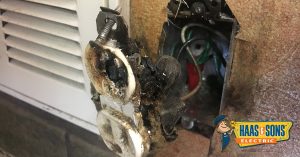Top-rated Maryland Local Licensed Electrician Answer Your Hot Outlet Questions

What happens if we come back in an hour and the outlet is still hot?
Elevated outlet temperature with a single object or no objects plugged in suggests likely overload. In homes, series-wired circuits allow non-functional outlets to overload due to excessive demand on other outlets. This is especially important to consider if you’re planning larger projects like electric car charger installation in Maryland, since EV chargers require dedicated circuits and proper load capacity
Why is my outlet warm with nothing plugged in?
A few reasons your electrical outlet feels hot include:
- Your circuit is overloaded.
- Damaged or improper wiring.
- You have a dimmer switch.
Although you can solve the first two reasons, dimmer switches will typically feel warmer than most outlets due to the type of use. Contact us today to find out more.
An outlet that's a bit warm is not overly concerning due to waste heat - BUT, anything very warm or hot to the touch should be checked out.
Why does the plug on my charger/appliance get hot?
A plug that becomes hot to the touch may be shedding "waste heat." This is energy that the plug cannot pass through to the appliance, so the plug itself begins to heat up. A warm plug is not overly concerning, but a HOT plug should be unplugged and investigated. For example, if the hot tub plug is getting hot, it could be an indication that the appliance is drawing more power than the plug can handle. A plug might get hot because it's loose and the appliance is asking for more electricity to operate correctly — this may be more energy than the plug can handle.
We recommend pulling a hot plug and leaving it unplugged until you can have a licensed electrician near you (or appliance repair person) check your unit & outlet. You can try plugging it into another outlet briefly to see if it continues to heat - this could be indicative of a problem with the appliance instead of the outlet - although both should be checked out.
What if my outlet is too hot to touch?
No, an outlet should not be hot. If your outlet is hot, that indicates that there is an issue that needs to be addressed. If you notice that your outlet is hot, you should unplug anything that is plugged into it and call an electrician right away. However, if your outlet is warm, that may simply indicate it has recently been used for a long duration of time. To get more information, call Haas & Sons Electric today.
When it comes to preventing outlets and switches from overheating, there are a few things you can do to try to prevent it from occurring at all. Some ways to prevent outlets and switches from overheating are:
- Reduce your use of power strips.
- Check the type of transformers your appliances use.
- Have your home wiring inspected to ensure it is set up properly.
However, it is still good to also be vigilant about what you plug in before your switches or outlets overheat to determine the source of the issue. Call us today to have our licensed electrical repair service Maryland technicians inspect the situation and recommend any needed house electrical repairs.
Yes, an outlet can cause a fire if nothing is plugged in. However, it is highly unlikely that your outlet will catch fire with nothing plugged in as long as:
Since the technology of outlets has evolved, there is a very low chance that your outlet would catch on fire if nothing was plugged in. To learn more or have your outlets inspected, contact us today.
Call us. The reasons could be varied and should be investigated from the electrical panel all the way to the problem outlet. It would not be responsible for us to give advice on how to fix this as we just don't know the cause without taking a look.
To get more information, call Haas & Sons Electric today.
Not always. Sometimes the plug might not be able to handle all of the electricity the outlet is passing through - and that may cause it to get warm. Warm is not terrible as long as it's not hot! A hot outlet or plug is dangerous and the plug should be removed and/or the breaker switched off as soon as possible. Call an electrician to come check things off!
Occasionally a homeowner can run across an outlet that is warm when nothing is plugged in or "on." If the switch is a dimmer switch, they're much more likely to warm up during use and can be warm for a while after they're turned off. Warm is not HOT, though. Any outlet or switch that becomes hot can be a victim of faulty wiring, corroded wires, water damage, or some other anomaly. You should unplug and turn off the outlet or switch and have a licensed electrician come to take a look right away.
To learn more or have your outlets inspected, contact us today.
When a plug gets hot after being plugged into an outlet, it typically indicates an issue with the electrical connection or the plug itself. Here are a few possible reasons why a plug may become hot:
- Overloaded Circuit: If the device or appliance connected to the plug draws more current than the outlet or circuit can handle, it can cause the plug to heat up. Overloading the circuit can lead to overheating, which is a safety hazard.
- Shedding Energy: Excessive energy is dissipated or released within an electrical outlet due to various factors. It can occur when the outlet is overloaded with devices drawing more current than it can safely handle, leading to heat buildup and potential hazards. To prevent energy shedding, it is crucial to ensure that the electrical load is within the outlet's capacity and that proper electrical connections are maintained. This is where its important to differentiate between a "hot" plug and a "warm" plug. Warm is probably okay (but should be checked if consistent) - hot should be unplugged and checked by a licensed electrician in Maryland right away
- Loose Connections: Loose or faulty electrical connections within the plug can generate heat. If the wires inside the plug are not properly secured or if the prongs do not make a solid connection with the outlet, resistance can occur, leading to heat buildup.
- Poor Quality or Damaged Plug: A plug that is of low quality or damaged (cracked, frayed wires, etc.) can cause resistance and subsequent heat generation. It is important to use plugs that meet safety standards and are in good condition.
- Faulty Wiring: In some cases, the issue may lie with the electrical wiring in the building. Poorly installed or damaged wiring can result in an increased resistance, causing the plug to heat up.
- High Ambient Temperature: If the ambient temperature around the plug is already high, such as in a hot environment or when placed near a heat source, the plug can absorb and retain heat, making it hot to the touch.





